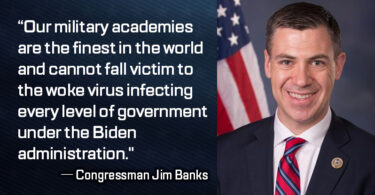DOD went from using DEI to DEIA (Accessibility) to DEIAB (Belonging) all in an attempt to make this CRT-agenda palpable to people and/or to trap them (how can you be against having a ramp for someone in a wheelchair?). DOD is also quietly taking out the E for Equity because equity removes merit. If it actually meant equal OPPORTUNITY, they would have kept it, but it doesn’t. Marxists make things up (pseudo-reality) and draw you in to their definitions. When people push back, they just make up something new.
By Emmy Griffin | Patriot Post
Diversity, equity, and inclusion (collectively known as DEI) sound like positive attributes. However, like critical race theory (CRT) and affirmative action (AA), DEI masks an agenda that is anything but positive.
DEI comes from the perspective that minorities should get preferential treatment when it comes to jobs, grants, academic reforms, and even disciplinary policies.
In the business world, DEI is a way to add to a company’s environmental, social, and governance (ESG) score — yet another leftist effort at rigging the system.
However, the term “DEI” is fading from the corporate lexicon. As The Washington Post notes:
“Amid growing legal, social and political backlash, American businesses, industry groups and employment professionals are quietly scrubbing DEI from public view — though not necessarily abandoning its practice. As they rebrand programs and hot-button acronyms, they’re reassessing decades-old anti-discrimination strategies and rewriting policies that once emphasized race and gender to prioritize inclusion for all.”
What is wrong with DEI?
The same thing that’s wrong with CRT, AA, and ESG — it emphasizes superficial attributes such as race, gender, or sexual orientation and ignores the more significant and important attributes such as good character, qualifications, and merit.
It’s a communistic idea that classifies people based on superficial attributes and grants them a certain amount of “oppressed status.”
Dan Lennington of the Wisconsin Institute for Law & Liberty points out that even just providing DEI based on “minorities” is flawed because there is no universal definition of what constitutes a minority. Some African-Americans are considered “white.” Not everyone from South America is considered Hispanic since that refers to Spanish-speaking people. Brazilians, for instance, speak Portuguese.
However, leftists aren’t going to be bogged down by defining terms. They are much more interested in pushing forward with their agenda and winning.
In this case, leftists are using their favorite method — simply rebranding. DEI is now “People and Planet Metrics” or some other term conjured up by a company’s legal team or human resources department.
In other words, they aren’t changing course, they’re just hiding it better.
DEI, in any form it decides to take, is discriminatory in a negative way. It cripples some it wrongly deems unworthy and elevates others based on characteristics that are arbitrary or politically chic.
As Jenin Younes and Christopher Rufo aptly state:
“The only constitutional and moral approach is to establish a single, color-blind standard applicable to all individuals, regardless of their background. Any policies which, by definition, subordinate the individual to the group and suppress our speech will harm our nation in the long run and exacerbate, rather than resolve, racial and ethnic prejudice.”
Until the fruits of the poisoned tree of intersectional hierarchy are rooted out, there will never be true justice or equality, and the people who are ultimately hurt the most are the people leftists purport to help.
Woke no more: Companies were starting to support political causes. Now they’re too scared to speak up. (Business Insider, 9 May 2024)
. . . .Plenty of companies are reining in their rhetoric and in some cases action on issues such as sustainability and diversity. They’re being extra cautious about weighing in on the social and political debates of the day, especially in an election year. In some cases they’re telling their workers to cool it, too; Google, for example, fired more than two dozen workers for protesting its contract with Israel’s government.
“Many executives have made the decision that it’s sometimes safer to just be silent versus to take a stance, because they have a fiduciary responsibility to their shareholders and their bottom line and are very concerned about how this will be perceived,” said Naomi Wheeless, a board director for Eventbrite who was formerly a global head of customer success at Square.
Call it the great un-wokening.
. . . . .”You can almost say that ESG ran unopposed for a few years,” said Andrew Jones, a senior researcher at the Conference Board’s ESG Center.
Then came the backlash. Over the past couple of years there’s been an uproar, especially among conservatives, about the rise of “woke capitalism.” Bud Light came under scrutiny from the right when it partnered with the transgender influencer Dylan Mulvaney for a small-scale Instagram campaign last spring. Then Target took heat about its Pride merchandise, with some customers destroying displays in stores over a campaign it has run for years.
These high-profile examples spooked companies, which are now afraid to poke the hyped-up right-wing bear. In the market, ESG funds haven’t been doing so hot. According to Morningstar, investors pulled $13 billion out of sustainable funds in 2023 amid underperformance and political unease.
“It’s a bona fide countermovement against both ESG and DEI,” said Philip Mirvis, an organizational psychologist and research fellow at Babson College’s Social Innovation Lab. “Certainly for businesses, this is about making money. And in the conventional logic, all of these issues represent risks.”
. . . .The chilling effect is palpable. Fink won’t say “ESG” anymore because, he says, it’s been “weaponized.” Asset managers are quieting down on ESG as part of a “greenhushing” trend. Some companies that made a big deal about their DEI efforts in 2020 are downsizing those, too. Data provided to me by FactSet, a financial-data company, shows that mentions of ESG and DEI in S&P 500 companies’ quarterly earnings calls with analysts have taken a nosedive over the past few years.
For the fourth quarter of 2020, 131 companies mentioned ESG, and 34 mentioned DEI or diversity and inclusion. For the fourth quarter of 2023, those numbers dropped to 28 and four. . . . . (read more)









Leave a Comment